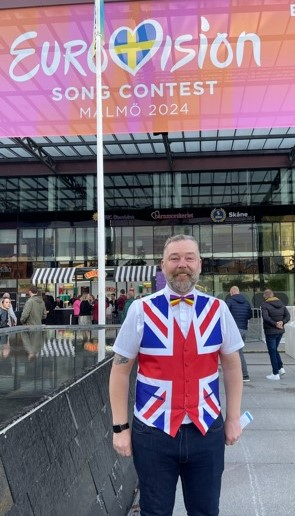As Pride Month draws to a close, we often reflect on how much society has changed but it is equally important to recognise the individuals who have walked difficult roads to make that progress possible. For Craig, Director of Commissioning and Integration, and Deputy Chief Strategy and Performance Officer, Pride is more than a celebration, it's a reminder of the journey he took to stand proud, both personally and professionally.
Craig was born in 1971 and grew up on a close-knit council estate in Worcester. His parents worked as a butcher and hospital secretary and he remembers his childhood with fond memories especially the sense of community on his cul-de-sac, evident in the fact that these neighbours have remained lifelong friends. He was hardworking and earned a scholarship for a place at the local all boys grammar school, but wearing a different uniform from most of the children on the estate did present some early challenges.
In was during his time at school that Craig began to realise he was different to his friends, as he quietly fell in love with another student, but their relationship was hidden from the world. His boyfriend the head of the Navy cadets and Craig, the head of the RAF cadets, never disclosed their relationship to anyone, although they felt safe in school, the outside world felt very different.
At 17, Craig applied for a university scholarship in the RAF, hoping to train as a navigator in fast jets or as a military police officer. His preparation was meticulous, and his interview skills strong until the final question, “would you arrest somebody for being gay?” Craig replied “I know putting on a blue uniform doesn’t change someone’s sexuality, so no.” This answer meant Craig wasn’t accepted and set the tone for many years of silence and suppression to follow.
Studying geography at university was a place to escape to, but not yet a place where Craig could be his true self. Craig explains:
“I still wasn’t honest about my sexuality, I continued to consider every word I spoke and every gesture I made to make sure it remained a secret, it is exhausting because the only time you aren’t pretending is when you are asleep.
It wasn’t until I was on placement in the Netherlands and I was invited to my first gay club that I allowed myself to feel the joy of being seen. All I could see around me was people enjoying themselves and I danced the night away in total freedom, I cried that night as I felt such a sense of belonging.”
Coming out to Craig’s parents wasn’t easy, they both mourned the expectations they had for him and his father especially found it difficult to understand. Craig continues:
“Speaking to my parents wasn’t the idyllic or comforting moment seen recently on Heartstopper, it was quite the opposite. They did and do continue to do their best but there has been struggles and vast differences of opinions.”
In 1993, Craig joined the NHS but still hiding his sexuality at work and navigating questions about his personal life all became too much and a few years later Craig attempted to take his own life. He woke up in hospital surrounded by concerned friends and decided to make a fresh start.
Here came a new job and a new chapter, where Craig spoke about his sexuality and partner at work and a gay chief nurse became an inspiring role model. Craig continues:
“At this point I felt like I didn’t have to choose between hiding myself and being respected at work, but it didn’t mean the challenges were over. I remember vividly a consultant who refused to let me be in his consulting room, he wouldn’t shake my hand or speak to me. There were no consequences for his actions or reporting systems, you were just expected to navigate around it.”
Slowly things have changed and with the support of colleagues, friends and more visibility of role models, Craig has established himself as a senior leader. “I know I sit in rooms where others from our community are not present, so I speak up, because someone needs to.”
Craig recalls challenging a senior level discussion around transgender healthcare. Years later a GP reached out to thank him, saying his words gave them the confidence to be their authentic self, “you never really know who’s watching or listening, that’s why it matters to speak up.”
Now at LSCft, Craig feels fully accepted. From casual Monday morning chats about his weekends with his partner, to his love for pickleball, family days out with his niece and nephew or his passion for Eurovision, his life is no longer censored.
Craig knows his experience isn’t universal and he acknowledges that he doesn’t speak for every member of the LGBTQ+ community and adds:
“I can only share my own lived experiences and use it to create a safe space for others to share theirs and to be that advocate. Our community isn’t hard to reach, we just have to be better at reaching out, connecting and representing with them and that is why Pride still matters.”
Looking back, Craig sometimes wonders if he created his own ‘pink ceiling’ limiting himself in the absence of visible role models, but he knows that being where he is now, he’s helping to remove that ceiling for someone else.
Craig concludes:
“You can’t become what you can’t see, and I’m thankful that young people are seeing more acceptance, they have equal rights and can get married which is very different from my younger years. I don’t want us to go backwards so that is why Pride feels more important than ever.”
Craig’s story is a story of resilience, self-discovery and advocacy, his courage to live openly and lead emphatically send a powerful message and demonstrates that every step forward matters.

